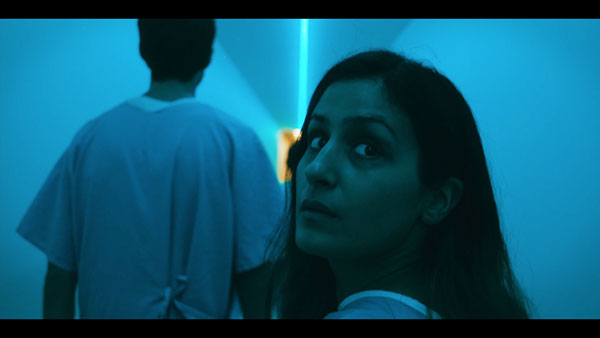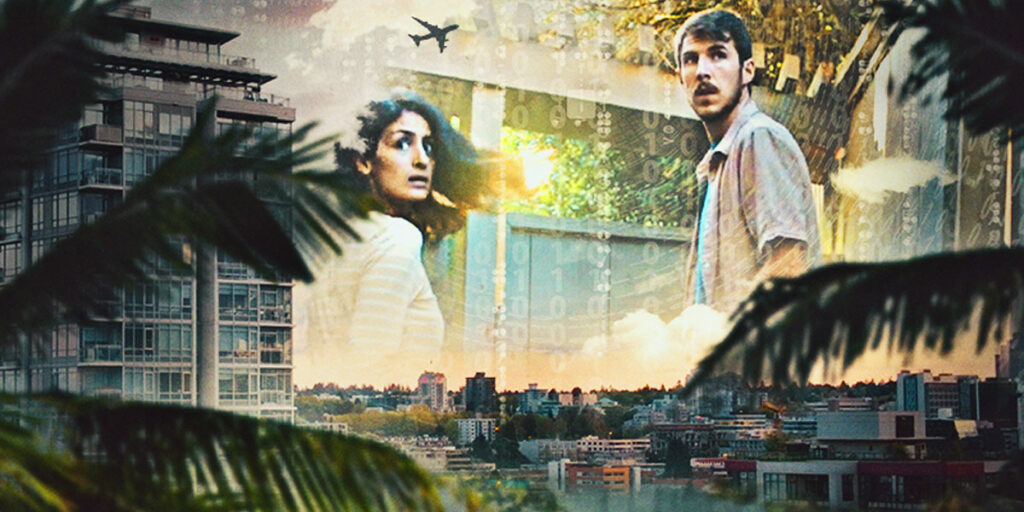Residents of Arcadia is a watchable yet uneven film about immigration and the internet that suffers under the weight of its disparate themes and ideas.
NOTE: This review of Residents of Arcadia spoils a twist that occurs at around the fifteen-minute mark. It sets up the rest of the film and therefore must be discussed to give the movie a fair shake.
The internet is a tricky thing to depict on film, since it’s all just pixels and data you’re stuck either showing a bunch of laptop and cell phone screens (a supremely uncinematic choice) or coming up with some gimmick that is often more distracting than it is engaging (think of the floating text messages in BBC’s Sherlock). In fact, it seems that the best way to tackle the subject, done best in Fincher’s The Social Network, is to not show the internet at all, and instead focus on how it affects how we navigate the world and the relationships with the people in it. Residents of Arcadia, the debut feature of writer-director Dom Cutrupi, simultaneously sidesteps several common pitfalls of the internet film and succumbs to more than a few clichés. Leading to a film that’s more interesting in theory than it is in execution.
The opening sequences of Residents of Arcadia work fairly well: we are introduced to Steve and Anika Lareto (Michael S Perry and Kamantha Naidoo), an influencer couple living in an affluent Canadian subdivision where they while the days away promoting luxury sunscreen and crafting motivational speeches. Both are wildly successful (almost comically so) and fall neatly into the bratty internet personality stereotype trend, individuals that have been granted the success they have always dreamed of, leaving nothing to cover up how damaged their relationship is. These scenes are peppered with subtle insults and petty fights that do an adequate job of conveying the hollowness of their marriage.
After those scenes comes a dinner with friends in which it is revealed that Steve and Anika are both first-generation immigrants (he from Italy, she from India) who have distanced themselves from their family’s culture, which will become very important later. The best word to describe this opening section is functional: every aspect, from the writing to the acting to the house that the couple lives in, does the bare minimum in giving you the information you need, no more, no less. This isn’t the worst thing in the world: there are plenty of movies that can’t even get that right, but it does begin to wear thin after a few scenes. Spoilers from the next paragraph onward.

And then, in true sci-fi thriller fashion, the film throws in a world-altering twist, and we get to the real meat of the story. A mysterious countdown timer appears on all the reflective surfaces of the home, and when it reaches zero the couple falls asleep. The couple wakes up in a sterile office to reveal that Steve and Anika are not Steve and Anika, they are Mira (now played by Ishaval Gill) and Remo (Nick Preston) two immigrants (still Italian and Indian) on a work visa in Canada. For the last year, they have been in Arcadia, a Ready Player One-style online space, crafting the avatars of Steve and Anika to live the influencer lives of their dreams. Cool concept, right? Unfortunately, it’s mostly downhill from here, both in terms of the characters’ situation and in the execution of the film’s two main ideas: immigration, and the internet.
After regaining some of their memories, Mira and Remo are informed that Arcadia has kicked them out early, and unless they find the money to reenter Arcadia (a hefty $10,000) they will be deported to their home countries and separated for the foreseeable future. All this information is dumped on the audience and characters in an extended scene where the enigmatic Doctor Lin (Stella Lai, in the film’s best performance) throws a lot of new information at the viewer. The internet has now been split into a free tier (“common” internet) and a premium tier (internet “prime”) where all the money has fled to and where Arcadia is located. Arcadia kicked out the couple because of a glitch. The only way back into Arcadia is to pay the fee and while they wait their avatars will be inactive. They have twenty-one days to find a new visa before they are deported. It’s a dense and ineffective exposition dump that only serves to foreshadow the clunky writing that will plague the rest of the runtime.
The biggest flaw that befalls Residents of Arcadia is simply that Cutrupi has too many good ideas, and they can’t all be adequately explored in 84 minutes. The middle section of the film drops the science fiction elements almost entirely and shifts its focus to the plight of immigrants in a country where the promise of residence is tenuous at best, unfortunately, this is also the worst section of the film and, aside from a particularly touching monologue from Mira around the fifty-five-minute mark, only served to remind me of Mohsin Hamid’s excellent 2017 novel “Exit West”, which tackles many of the same themes of immigration with much more nuance. It comes across as the film having a lot of great points about identity and nationality that it wants to make, but the execution is so clumsy that it gets lost on its way out. Though it is worth noting that Cutrupi was born in Italy and moved to Canada, while I have never lived anywhere outside my home state. So milage during this section may vary.
One’s response to Residents of Arcadia will probably depend on their feelings towards the third act. Which I will not spoil, but I will say that it includes a particularly inspired twist that serves as the best part of the film before said twist is used to make a moral argument that left me with a sour taste in my mouth as the credits rolled. If you can vibe with the last twenty minutes it will probably be enough to color your experience towards the whole thing positively; if not, then the film will probably fade into obscurity, mashed in with the multitude of socially conscious sci-fi parables that have dominated film and television in the last decade.
Residents of Arcadia will be available to watch on demand in the US from November 11, 2022.

